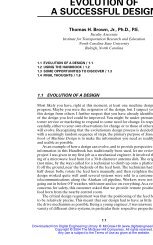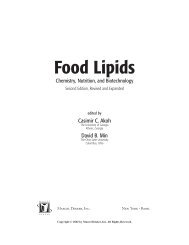Science of Water : Concepts and Applications
Science of Water : Concepts and Applications
Science of Water : Concepts and Applications
You also want an ePaper? Increase the reach of your titles
YUMPU automatically turns print PDFs into web optimized ePapers that Google loves.
156 The <strong>Science</strong> <strong>of</strong> <strong>Water</strong>: <strong>Concepts</strong> <strong>and</strong> <strong>Applications</strong><br />
Ecology is important because the environmental challenges we face today include all the same<br />
ones that we faced more than 30 years ago at the fi rst Earth Day celebration in 1970. In spite <strong>of</strong><br />
unfl agging efforts <strong>of</strong> environmental pr<strong>of</strong>essionals (<strong>and</strong> others), environmental problems remain.<br />
Many large metropolitan areas continue to be plagued by smog, our beaches are periodically<br />
polluted by oil spills, <strong>and</strong> many <strong>of</strong> our running <strong>and</strong> st<strong>and</strong>ing waters (streams <strong>and</strong> lakes) still suffer<br />
the effects <strong>of</strong> poorly treated sewage <strong>and</strong> industrial discharges. However, considerable progress has<br />
been made. For example, many <strong>of</strong> our rivers <strong>and</strong> lakes that were once unpleasant <strong>and</strong> unhealthy are<br />
now fi shable <strong>and</strong> swimmable.<br />
This is not to say that we are out <strong>of</strong> the woods yet. The problem with making progress in<br />
one area is that new problems are discovered that prove to be even more intractable than those we<br />
have already encountered. In restoring our running <strong>and</strong> st<strong>and</strong>ing waters to their original pristine<br />
state, this has been found to be the case.<br />
Those interested in the science <strong>of</strong> freshwater ecology (e.g., water practitioners <strong>and</strong> students) must<br />
underst<strong>and</strong> the effects <strong>of</strong> environmental stressors, such as toxics, on the microbiological ecosystem<br />
in running <strong>and</strong> st<strong>and</strong>ing waters. Moreover, changes in these ecosystems must be measured <strong>and</strong><br />
monitored.<br />
The science <strong>of</strong> freshwater ecology is a dynamic discipline; new scientifi c discoveries are made<br />
daily <strong>and</strong> new regulatory requirements are almost as frequent. Today’s emphasis is placed on<br />
other aspects <strong>of</strong> freshwater ecology [e.g., nonpoint source pollution <strong>and</strong> total maximum daily load<br />
(TMDL)]. Finally, in the study <strong>of</strong> freshwater ecology it is important to remember the axiom: left to<br />
her, Mother Nature can perform wonders, but overload her <strong>and</strong> there might be hell to pay.<br />
SETTING THE STAGE<br />
We poison the caddis fl ies in a stream <strong>and</strong> the salmon runs dwindle <strong>and</strong> die. We poison the gnats in a<br />
lake <strong>and</strong> the poison travels from link to link <strong>of</strong> the food chain <strong>and</strong> soon the birds <strong>of</strong> the lake margins<br />
become victims. We spray our elms <strong>and</strong> the following springs are silent <strong>of</strong> robin song, not because we<br />
sprayed the robins directly but because the poison traveled, step by step, through the now familiar elm<br />
leaf-earthworm-robin cycle. These are matters <strong>of</strong> record, observable, part <strong>of</strong> the visible world around<br />
us. They refl ect the web <strong>of</strong> life—or death—that scientists know as ecology.<br />
—R. Carson (1962)<br />
As Rachel Carson points out, what we do to any part <strong>of</strong> our environment has an impact upon<br />
other parts. There is the interrelationship between the parts that make up our environment. Probably<br />
the best way to state this interrelationship is to defi ne ecology. Ecology is the science that deals with<br />
the specifi c interactions that exist between organisms <strong>and</strong> their living <strong>and</strong> nonliving environment. The<br />
word “ecology” is derived from the Greek word oikos, meaning home. Therefore, ecology is the<br />
study <strong>of</strong> the relation <strong>of</strong> an organism or a group <strong>of</strong> organisms to their environment (their “home”).<br />
Charles Darwin explained ecology in a famous passage in The Origin <strong>of</strong> Species—a passage<br />
that helped establish the science <strong>of</strong> ecology. A “web <strong>of</strong> complex relations” binds all living things<br />
in any region, Darwin writes. Adding or subtracting even a single species causes waves <strong>of</strong> change<br />
that race through the web, “onwards in ever-increasing circles <strong>of</strong> complexity.” The simple act <strong>of</strong><br />
adding cats to an English village would reduce the number <strong>of</strong> fi eld mice. Killing mice would benefi t<br />
the bumblebees, whose nest <strong>and</strong> honeycombs the mice <strong>of</strong>ten devour. Increasing the number <strong>of</strong><br />
bumblebees would benefi t the heartsease <strong>and</strong> red clover, which are fertilized almost exclusively by<br />
bumblebees. So adding cats to the village could end by adding fl owers. For Darwin, the whole <strong>of</strong><br />
the Galapagos archipelago argues this fundamental lesson. The volcanoes are much more diverse<br />
in their ecology than their biology. The contrast suggests that in the struggle for existence, species<br />
are shaped at least as much by the local fl ora <strong>and</strong> fauna as by the local soil <strong>and</strong> climate. “Why else<br />
would the plants <strong>and</strong> animals differ radically among isl<strong>and</strong>s that have the same geological nature,<br />
the same height, <strong>and</strong> climate?” (Darwin, 1998).






